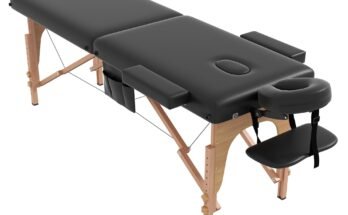Massaging tight muscles feels good because it promotes blood flow, releases tension, and activates the body’s relaxation response. Tight muscles can cause discomfort, pain, and limited range of motion, affecting our ability to perform daily activities.
Whether it’s from stress, exercise, or poor posture, these tight muscles can greatly impact our well-being. Fortunately, there is a simple and effective way to alleviate the discomfort: massage therapy. Massaging tight muscles not only feels good but also provides numerous health benefits.
With the application of pressure, motion, and stretching, massage helps increase blood flow to the area, reducing inflammation and promoting healing. The gentle manipulation of muscles also releases tension and knots, allowing the body to relax and de-stress. We will explore why massaging tight muscles feels good and the science behind it. So, let’s delve into the relaxing and therapeutic world of massage therapy.

Credit: www.primemassagechairs.com
The Science Of Massage Therapy
Have you ever wondered why massaging tight muscles feels so good? The answer lies in the science of massage therapy. Whether you’re getting a professional massage or simply rubbing your own sore muscles, the physical and mental benefits are undeniable. In this article, we’ll explore the science behind massage therapy and explain why it can leave you feeling relaxed, rejuvenated, and pain-free.
How Massage Affects The Body
Massage therapy involves the manipulation of muscles, soft tissues, and connective tissues in the body. This manipulation not only helps release tension and knots but also stimulates various physiological responses that can positively impact your overall well-being.
When applied with proper technique, massage can:
- Improve blood circulation, which promotes the delivery of oxygen and nutrients to the muscles and speeds up the removal of waste products.
- Reduce muscle tension and stiffness, helping to improve flexibility and range of motion.
- Stimulate the lymphatic system, boosting the immune system and assisting in the removal of toxins from the body.
- Promote relaxation by activating the body’s parasympathetic nervous system, combating the effects of chronic stress and anxiety.
By targeting specific muscle groups and employing various massage techniques, therapists can address a wide range of musculoskeletal issues, including chronic pain, injuries, and postural imbalances.
Understanding Endorphins And Relaxation
One of the reasons why massaging tight muscles feels good is the release of endorphins. Endorphins are chemicals produced by the body that act as natural painkillers and mood enhancers. When you receive a massage, the pressure and manipulation of your muscles prompt the release of endorphins, which can reduce pain and create a sense of euphoria and relaxation.
In addition to endorphins, massage can also stimulate the production of serotonin and dopamine, neurotransmitters that are associated with feelings of happiness, well-being, and relaxation. This explains why people often report improved mood and reduced anxiety after a massage session.
The physical contact and human touch involved in massage therapy also play a significant role in promoting relaxation. Touch is a powerful form of communication that releases oxytocin, also known as the “cuddle hormone.” Oxytocin promotes feelings of trust, bonding, and emotional connection, further enhancing the relaxation response.
In conclusion, the science behind massage therapy is fascinating. By understanding how massage affects the body, including the release of endorphins and the power of human touch, we can appreciate why massaging tight muscles feels so good. So, the next time you’re in need of some relaxation or relief from muscle tension, consider booking a massage and experience the science-backed benefits for yourself.

Credit: www.facebook.com
The Role Of Tight Muscles
When it comes to understanding why massaging tight muscles feels good, it’s essential to explore the role that tight muscles play in our bodies. Tight muscles can be a result of various factors such as stress, exercise, or poor posture.
Causes Of Muscle Tightness
Tight muscles can be caused by several reasons, including:
- Stress: Stress can cause muscle tension and tightness, as our bodies respond to stress by going into a state of “fight or flight,” which involves muscle contraction.
- Exercise: Engaging in vigorous exercise or overexerting ourselves can lead to muscle tightness, as the muscles may constrict due to the strain they are subjected to.
- Poor posture: Sitting or standing in a position that puts stress on certain muscles for prolonged periods can result in muscle tightness as well.
- Inactivity: Lack of movement and sedentary lifestyle can lead to muscle tightness, as the muscles are not actively engaged and may become stiff.
Effects On Overall Well-being
Tight muscles can have various effects on our overall well-being:
- Physical discomfort: Tight muscles can cause physical discomfort, such as pain, stiffness, and limited range of motion.
- Mental stress: The physical discomfort caused by tight muscles can contribute to mental stress and tension.
- Reduced circulation: Tight muscles can restrict blood flow to the affected areas, resulting in reduced circulation.
- Impaired flexibility: Muscle tightness can make it challenging to perform activities that require flexibility, such as bending, reaching, or exercising.
- Reduced performance: Tight muscles can hinder athletic performance and limit our ability to engage in physical activities effectively.
Understanding the causes and effects of tight muscles helps us comprehend why massaging them feels good. The gentle pressure and kneading of a massage help relieve muscle tension, increase blood flow, and promote relaxation. It is the combination of these factors that provides the pleasurable sensation and brings relief to our bodies.
Why Massaging Tight Muscles Feels Good
Do you ever wonder why massaging tight muscles feels so good? The relief and relaxation we feel after a good massage are undeniable. In this blog post, we’ll explore the science behind why massaging tight muscles feels good, and the physiological benefits it offers for our bodies.
Release Of Tension And Pain
When a massage therapist works on tight muscles, tension and pain are released. This is due to the manipulation of soft tissues which helps to break down adhesions and knots, allowing the muscles to relax. The pressure applied during the massage stimulates the nerves and triggers the release of endorphins, which are the body’s natural painkillers. This release of tension and pain leaves us feeling remarkably better after a massage session.
Improvement In Blood Circulation
Massaging tight muscles also leads to an improvement in blood circulation. The pressure applied to the muscles during a massage helps to widen the blood vessels and promote better blood flow. This improved circulation delivers more oxygen and nutrients to the muscles, while also aiding in the removal of metabolic waste products. As a result, the muscles feel rejuvenated, and we experience a sense of relaxation and well-being.

Credit: www.amazon.com
Exploring Emotional Benefits
Reduction Of Stress And Anxiety
Massaging tight muscles help reduce stress and anxiety levels by releasing tension.
Enhanced Mind-body Connection
Massaging tight muscles improves the mind-body connection, promoting overall well-being.
The Mind-body Connection
The Mind-Body Connection: When we massage tight muscles, the benefits extend beyond physical relief. The process taps into the intricate relationship between the mind and body, unlocking a world of wellbeing.
Neurological Mechanisms Of Pleasure
Massaging tight muscles triggers a cascade of feel-good chemicals in the brain, such as endorphins, serotonin, and dopamine, which reduce pain and induce relaxation.
This rush of neurotransmitters not only dulls pain signals but also promotes a sense of calm and euphoria, enhancing our overall mood.
Long-term Effects On Mental Health
Regularly soothing tight muscles through massage can contribute to improved mental health by reducing stress, anxiety, and symptoms of depression.
The release of tension in the body can lead to a clearer mind, better emotional resilience, and an overall sense of well-being.
Frequently Asked Questions Of Why Does Massaging Tight Muscles Feel Good
Why Does It Feel Good To Massage Tight Muscles?
Massaging tight muscles feels good because it increases blood flow, releases endorphins, and reduces pain. It also helps to relax the muscle fibers and relieve tension.
Why Does Squeezing Muscles Feel Good?
Squeezing muscles feels good because it helps to release tension and increase blood flow, resulting in a relaxation response. It also activates sensory receptors, triggering the release of endorphins, which are natural painkillers and mood enhancers. So, it feels good physically and mentally.
Why Does It Feel Good To Massage Muscle Knots?
Massaging muscle knots feels good because it helps release tension, improve circulation, and reduce pain. By applying pressure to the knots, the muscles relax, promoting relaxation and a sense of relief.
Is It Better To Massage Or Stretch Tight Muscles?
Both massage and stretching can help relieve tight muscles. Massage promotes blood flow and relaxation, while stretching improves flexibility and range of motion. It’s best to combine both for optimal results. Listen to your body and consult a professional for personalized advice.
Conclusion
Massaging tight muscles feels good due to increased blood flow and release of tension. This can alleviate pain and promote relaxation. Understanding the science behind it helps us appreciate the benefits of massage therapy. Regular massage can improve overall wellness and enhance our physical and mental health.




